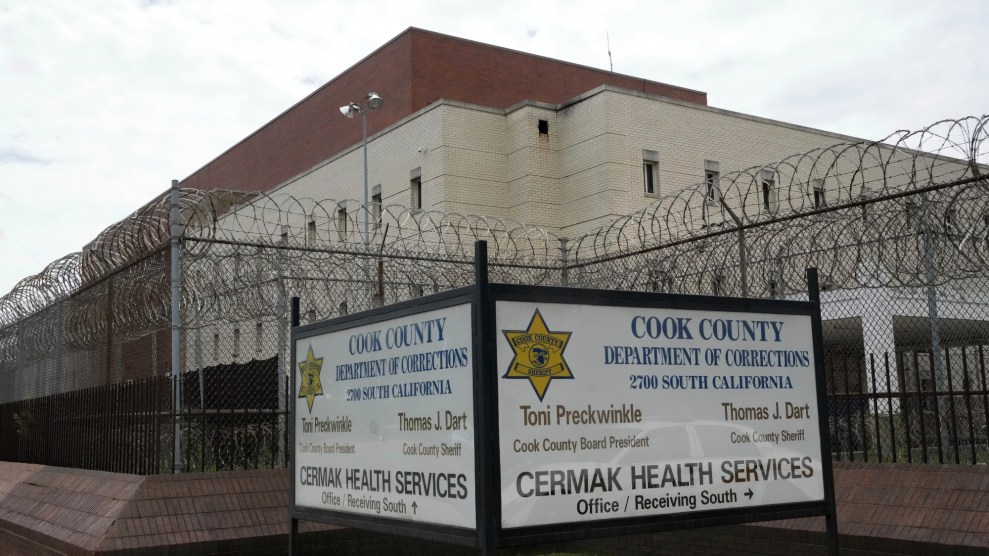OK, not quite. It’s true that New Orleans is floating plans to expand its local jail, the notorious Orleans Parish Prison, even though it already has the largest number of jail beds per capita of any city in the nation. It’s also true that most of us would like to see some BP executives there, languishing in pre-trial detention along with the hundreds of poor New Orleanians who can’t make bail after committing minor offenses. Unfortunately, we are unlikely to see this happen. But its good to know that there will be plenty of room for Tony Hayward and his entourage if it does.
Yesterday, the ACLU of Louisiana issued the following statement:
The ACLU of Louisiana calls on the New Orleans City Council to reject Sheriff Marlin Gusman’s plan to expand Orleans Parish Prison (OPP) to 5,832 beds, large enough for 1 bed for every 60 residents. OPP, currently being investigated by the U.S. Department of Justice, is already the largest per capita jail in the nation and the City’s own Planning Commission has recommended a smaller sized jail. The Sheriff’s request is scheduled to be heard by the Council this week…
[T]he Sheriff has been unable or unwilling to reveal what types of crimes people in his jail are charged with. “The scary thing is that he can’t even tell us who he is housing in the jail. Public drunkenness? Marijuana possession? He simply won’t tell us or doesn’t know,” said Katie Schwartzmann, Legal Director for the ACLU of Louisiana.
What is known is that from January 2007 until June 2009, on average just 2.24% arrests in New Orleans were for violent felonies. 86% of arrests were for misdemeanors, municipal, traffic violations, and other arrests. At the same time, roughly a third of the prisoners held at OPP are federal and state prisoners who have already been sentenced and should be held at state or federal facilities.
The expanded jail would provide one bed for every 60 residents of Orleans Parish. In comparison, the ACLU points out, the ratio in New York City is one jail bed for every 413 residents; in Los Angeles it is one for every 504; and in Chicago it is one for every 542.
Louisiana is known for its swift–if frequently unfair–justice. After Hurricane Katrina, New Orleans Mayor Ray Nagin warned “looters” that they would be sent “straight to Angola.” Instead, the warden of the Louisiana State Penitentiary, Burl Cain, hurried down to New Orleans to set up a temporary jail in the bus station, known as “Camp Greyhound.” Any people suspected of stealing a quart of milk for their starving children were summarily locked up–if they weren’t simply shot by cops or vigilantes.
Don’t expect anything of the sort for those BP execs. Eric Holder says “nothing is off the table,” but there’s little chance we’ll ever see them behind bars. Here’s what McClatchy’s Scott Hiaasen wrote on the subject last week:
U.S. Attorney General Eric Holder promises an aggressive criminal investigation of BP and its contractors for their actions leading up to the massive Gulf of Mexico oil spill, already the worst environmental disaster in U.S. history. But if history is any guide, don’t expect to see the CEO of BP in handcuffs.
Over the years, the Justice Department has repeatedly pursued criminal charges in major environmental accidents, from the Exxon Valdez oil spill in 1989 to the Three Mile Island nuclear accident a decade earlier. But in most high-profile environmental cases, criminal charges are brought mainly against the companies involved, while corporate executives typically escape punishment.
If BP is prosecuted and convicted of crimes, the company could face millions in criminal fines as well as civil penalties. But that won’t be nearly as satisfying as seeing its leaders in a cell at Angola.
This post also appears on James Ridgeway’s personal blog, Unsilent Generation.








